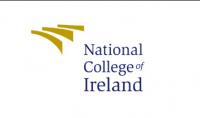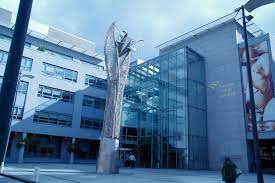
National College of Ireland
Dublin , Dublin , Ireland
- Founded: 1951
- Establishment: HE Institution / College
- Type: Public
- Total Students: 5000
National College of Ireland
At the close of the Second World War, there was a widespread desire to improve social conditions, which was joined, in Ireland, to a renewed sense of nationality and an awareness of the threat posed by the Soviet Union.
In the Irish Jesuit Province, a committee was appointed to consider who to apply to Ireland the principles enunciated in the papal social encyclicals. The committee was composed of Fr Coyne, Joseph Canavan, and Tom Counihan, who suggested the establishment of a social research centre, rather than a college. In 1948, Dr. Tierney, President of UCD, approached Fr. Coyne with a view to organising extra courses in Social and Economic Studies at UCD, working closely with trade union officials. This course proved so successful that at the end of the year a number of the trade union members approached Fr. Kent for further education. The result was the Catholic Workers College.
Fr. Edward Coyne, S.J., Principal Founder of the College, was heir to a well-established Jesuit tradition of social concern in Ireland, which included Tom Finlay, professor of economics at UCD and co-founder of the Irish Co-operative Movement, and Edmund Cahill, author and founder of An Rioghacht. Fr. Coyne continued this tradition of concern by his writings, and by his informal contact with trade unionists and businessmen, which he combined with his roles as Professor of Theology at Milltown Park and president of the Irish Agricultural Organisation Society.
The Catholic Workers College held its first course for trade union members at the recently acquired Sandford Lodge in Sandford Road, Ranelagh in February 1951.
When the college opened, lectures were held two nights a week, and subjects included “economic problems, trade union problems, argumentation; public speaking; catholic social principles; the Christian state; the Christian family; and history from the Christian point of view.”
The teaching staff in the 1950s included: Fr. Coyne Director, Rev Edmund Kent (his assistant who, in practice, ran the college), Revs Michael Moloney, Kevin Quinn, Laurence Kearns, Des Reid, Liam McKenna, and Michael Connolly. Also on the teaching staff in those years, and on so till the 1990s, was Mr. Andrew Ryan, who played a significant role in the college’s history.
In September 1951, a course for employers/management was commenced at the request of a number of employers. The college’s modest beginnings soon expanded. Phase 1 of a building programme was completed in 1956, and phase 2 in 1962.
Boards of sponsors from trade unions and employer/ management were set up to provide links with the world of industry, to provide assistance to the director, and to approve the awards of college diplomas and certificates to individual students.
In 1951, there were 103 registered students. By 1964, the number had risen to 1,296 attending trade union and management courses.
Significantly, when the new Liberty Hall was formally opened in 1965, with President de Valera, and the Taoiseach, Sean Lemass in attendance, the keynote address was delivered by Fr. Kent.
In 1966, the next stage of major development took place. The educational needs across the country were changing with the introduction of free education, and a spirit of reconciliation had been emphasised by the Second Vatican Council. Responding to change, the name of the college was changed to the College of Industrial Relations. The college now focused its attention on the development of industrial relations through the continuing education and formation of those involved in that area.
In 1969, Fr Quinn succeeded Fr. Kent as director.
The following year it was decided to offer an academic Diploma Course in Industrial Relations. This ultimately came to be recognised by the National Council of Educational Awards (NCEA). The college continued to pursue its successful Irish Personnel Management Programme, which it had started in 1968.
In 1972 Fr. John Brady succeeded Fr. Quinn as director of the college. He was to remain in that position until 1981.
During those nine years, there were many significant developments. The Irish Personnel Management course evolved to join the national Diploma in Industrial Relations as a NCEA-recognised programme; a Chartered Accountancy course for graduates was introduced; day-time and day-release courses were developed; and there was an increase in the core lecturing staff, comprising full-time lay lecturers as well as Jesuits.
The college continued to benefit, moreover, from the generous assistance of voluntary helpers, often past students who looked after evening enrolment, teas etc. The years 1972-1981 witnessed an increased emphasis on academic standards, and a growth in income from fees to meet increased expenditure. On the plant side, the main capital expenditure was in the extension of the car park.
In 1981, Fr. Bill Toner succeeded John Brady on an interim basis to prepare for the college's next major change. He served on a special working party set up by the Jesuit Provincial, Fr. Joseph Dargan, and composed of members drawn from unions and management under the chairmanship of Fr. Michael McGreil, to advise on how the college might best meet current and future needs and challenges. In his short but effective term, Fr. Toner consolidated internal staff relations, appointed a full-time librarian and assistant, improved office and staff facilities, acquired audio-visual hardware for the purpose of preparing students for the effective use of television and camera skills, and commenced the process of applying for degree status in Industrial relations studies.
In 1983 the working party report was issued, and the director designate, Fr. Thomas J. Morrissey, former headmaster of Crescent College Comprehensive, Limerick, returned from Preparatory programmes in the United States to take up to the position of director.
The working party’s report recommended the establishment of a board of management, and that the college pursue degree programmes and generally aim to raise its image and profile. As the only educational establishment offering a degree in industrial relations, and also with a view to expansion outside Dublin, it was decided to change the name of the college to National College of Industrial Relations.
A new crest was devised - showing the strong hands of the worker and manager clasped – and a new motto conveyed the colleges key commitment, namely, to work and justice, with the words “Per Laborem ad Justitiam”.
Further impetus to the college’s rising profile was provided by the inauguration of Honorary Fellowships in recognition of contributions to industrial relations from the sides of the trade unions and management. Other important events included being named in an Oireachtas Bill as an institution to which contributions could be made with tax benefits to the contributors; its choice as the location for key discussions between ESB management and union representatives when the country was on the verge of being plunged into darkness; and its director being asked by the Minister of Labour to chair a Ministerial Committee on worker participation.
To meet demand, a second storey was built onto the 1962 wing, in order to provide extra lecture halls, expand the library, increase office space, and provide a computer training centre.
In 1990 the director, Fr. Tom Morrissey, resigned for health reasons. The board of management advertised for a new director. Professor Joyce O’Connor, of Limerick University was chosen. Under her dynamic and concentrated leadership the college entered on its fourth period of expansion and adaptation, and its first such period under a lay director or president.
The first years of the new administration witnessed a number of significant developments. A Policy Research Centre was established in 1990. The following year, 1991-92, students became eligible for grants under the higher education grants scheme; and in 1993 the Board of Management of the college expanded to embrace a three-way partnership with trade unions, employers and the Jesuit Order.
Other developments between 1990 and 1998 included:
The generous transfer by the Jesuits in 1995 of the land and buildings at Sandford Road to the Board of Management of the college
A significant increase in student and staff numbers
The securing of government funding, and of private funding for pioneering new courses
The establishment of a Centre of Educational Opportunity
The expansion of Library services
The opening of many off-campus programmes in different parts of the country
The college was very fortunate in having had as chairman during this period of extensive development, the late Mr. Paddy Moriarty, who worked tirelessly to bring the college to its fifth period of expansion and adaptation as National College of Ireland. To facilitate this development, the Jesuit community at Sandford Lodge fittingly agreed to make available to the college the building and grounds where, 47 years previously, the historic venture first commenced.
Important Facts
There are a number of great reasons to choose NCI as your third-level institution - including our excellent qualifications, experienced staff, supportive atmosphere and city-centre location.
Highly relevant courses
Through our schools of business and computing we offer internationally recognised full and part-time programmes accredited through QQI. We work closely with industry and professional bodies such as Chartered Institute of Personnel and Development, Institute of Commercial Management, Irish Institute of Pensions Management, the Sales Institute of Ireland and others to ensure courses closely aligned to industry needs.
Small class sizes and student support
Our small group teaching model and friendly atmosphere mean students find NCI a very pleasant and supportive atmosphere to study in. Students prosper in an atmosphere where they get to know lecturers, staff and their fellow students. We also have great student support in place if you are having any difficulty adjusting to third level.
Friendly atmosphere
Many students find the general atmosphere and friendliness of NCI to be the most valuable part of their NCI experience. We welcome international students from all over the globe and domestic students of all ages. You will find a welcoming community of learners and staff and definitely make some friends along the way.
Experienced faculty
We work with a talented array of full-time and associate faculty. They are experts in their fields and combine the highest academic standards with industry experience and a real commitment to the learning of their students.
Modern city centre campus
Our purpose-built campus includes a spacious atrium area, tiered lecture theatres, modern computer labs and smaller executive suites and boardrooms. We have excellent transport links with the Luas and mainline train stations on our doorstep.
Tailored training
If you are an organisation seeking bespoke training we would be delighted to speak to you. We are the educational partner for a number of corporate bodies.
So whether it’s a short, part-time course, upgrading your qualification to a master's degree or coming through the CAO system, NCI can be a great choice for you. See what some of our students have to say on our YouTube page.
Ranking / Awards
National College of Ireland adheres to the highest standards for the development of its courses. The college works with relevant awarding bodies to ensure our courses achieve appropriate recognition within industry.
Quality and Qualifications Ireland (QQI) is the Awarding Body for the Certificate, Diploma, Degree and Masters programmes offered by National College of Ireland (NCI). QQI was established under the Qualifications and Quality Assurance (Education and Training) Act 2012. This new authority was created through the amalgamation of the Further Education and Training Awards Council (FETAC), the Higher Education and Training Awards Council (HETAC), the National Qualifications Authority of Ireland (NQAI) and the Irish Universities Quality Board (IUQB). As such, QQI has assumed all the awarding and quality assurance functions of these legacy bodies in addition to other statutory responsibilities.
QQI facilitates NCI in issuing certificates (parchments) to learners who have reached the standard for an award. The certificate acts as formal confirmation that the named person has demonstrated the knowledge, skill and competence required to achieve the specified award. All certificates issued by QQI list awards on the National Framework of Qualifications (NFQ). By giving an academic or vocational value to qualifications obtained in Ireland, the NFQ levels help indicate how an award can be used for training, education and employment opportunities both nationally and internationally.
As one of the largest Higher Education and Training providers in Ireland, offering over eighty full-time and part-time programmes at Levels 5-10 on the NFQ, NCI works in close partnership with QQI. All programmes delivered at NCI that are accredited by QQI are subject to validation, a regulatory process that determines if a QQI award can be offered in respect of a provider’s programme of education and training. All validation determinations are subject to a duration of enrolment condition, usually five years, which means that each programme must be revalidated to guarantee its continued viability for prospective learners and its relevance to the changing requirements of the labour market. This close partnership with QQI also ensures that NCI’s undergraduate and postgraduate programmes are informed by the most current practices in quality assurance and delivered to the highest standards of academic integrity.
In addition to QQI, NCI also offers programmes that are awarded by the Chartered Institute of Personnel and Development (CIPD) and the Institute of Commercial Management (ICM). A number of our programmes are also recognised by professional bodies. For example, the undergraduate psychology programmes are recognised by the Psychology Society of Ireland (PSI), the postgraduate human resources programmes are recognised by CIPD for membership purposes, while the accounting and finance programmes are recognised for exemption purposes by the Association of Chartered Certified Accountants (ACCA). NCI continues to seek further accreditations for its programmes to ensure that our learners are recognised by the relevant professional body upon graduation.
Features
-
Ranking: N/A

-
Ranking: N/A

- Type of Accommodation: Off Campus
Financials
Marketing Material
Contact Information
- Mayor Street Lower, International Financial Services Centre, Dublin, Ireland
- To know more contact PSA toll free number 18002585772
Programs Offered
BA (Honours) in Accounting and Finance
- Length 03 Year
- Total Tuition Fee 30000 EUR
- Application Fee 25 EUR
- Average processing time 20 days
BA (Honours) in Business
- Length 03 Year
- Total Tuition Fee 30000 EUR
- Application Fee 25 EUR
- Average processing time 20 days
BA (Honours) in Early Childhood Education and Care
- Length 04 Year
- Total Tuition Fee 40000 EUR
- Application Fee 25 EUR
- Average processing time 20 days
BA (Honours) in Human Resource Management
- Length 03 Year
- Total Tuition Fee 30000 EUR
- Application Fee 25 EUR
- Average processing time 20 days
BA (Honours) in Marketing Practice
- Length 03 Year
- Total Tuition Fee 30000 EUR
- Application Fee 25 EUR
- Average processing time 20 days
BA (Honours) in Psychology
- Length 03 Year
- Total Tuition Fee 30000 EUR
- Application Fee 25 EUR
- Average processing time 20 days
BA (Honours) in Recruitment Practice
- Length 03 Year
- Total Tuition Fee 30000 EUR
- Application Fee 25 EUR
- Average processing time 20 days
BSc (Honours) in Computing
- Length 04 Year
- Total Tuition Fee 40000 EUR
- Application Fee 25 EUR
- Average processing time 20 days
BSc (Honours) in Data Science
- Length 04 Year
- Total Tuition Fee 40000 EUR
- Application Fee 25 EUR
- Average processing time 20 days
MA in Human Resource Management
- Length 01 Year
- Total Tuition Fee 15000 EUR
- Application Fee 25 EUR
- Average processing time 20 days
MSc in Accounting
- Length 01 Year
- Total Tuition Fee 15000 EUR
- Application Fee 25 EUR
- Average processing time 20 days
MSc in Artificial Intelligence
- Length 01 Year
- Total Tuition Fee 15000 EUR
- Application Fee 25 EUR
- Average processing time 20 days
MSc in Artificial Intelligence for Business
- Length 01 Year
- Total Tuition Fee 15000 EUR
- Application Fee 25 EUR
- Average processing time 20 days
MSc in Cloud Computing
- Length 01 Year
- Total Tuition Fee 15000 EUR
- Application Fee 25 EUR
- Average processing time 20 days
MSc in Cybersecurity
- Length 01 Year
- Total Tuition Fee 15000 EUR
- Application Fee 25 EUR
- Average processing time 20 days
MSc in Data Analytics
- Length 01 Year
- Total Tuition Fee 15000 EUR
- Application Fee 25 EUR
- Average processing time 20 days
MSc in Entrepreneurship
- Length 01 Year
- Total Tuition Fee 15000 EUR
- Application Fee 25 EUR
- Average processing time 20 days
MSc in Finance
- Length 01 Year
- Total Tuition Fee 15000 EUR
- Application Fee 25 EUR
- Average processing time 20 days
MSc in Fintech
- Length 01 Year
- Total Tuition Fee 15000 EUR
- Application Fee 25 EUR
- Average processing time 20 days
MSc in International Business
- Length 01 Year
- Total Tuition Fee 15000 EUR
- Application Fee 25 EUR
- Average processing time 20 days
MSc in Management
- Length 01 Year
- Total Tuition Fee 15000 EUR
- Application Fee 25 EUR
- Average processing time 20 days
MSc in Marketing
- Length 01 Year
- Total Tuition Fee 15000 EUR
- Application Fee 25 EUR
- Average processing time 20 days

